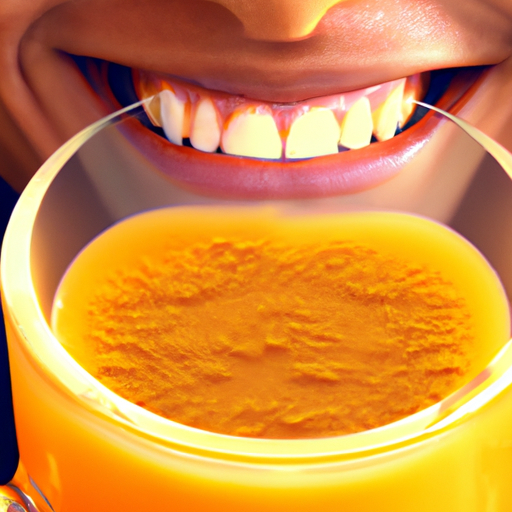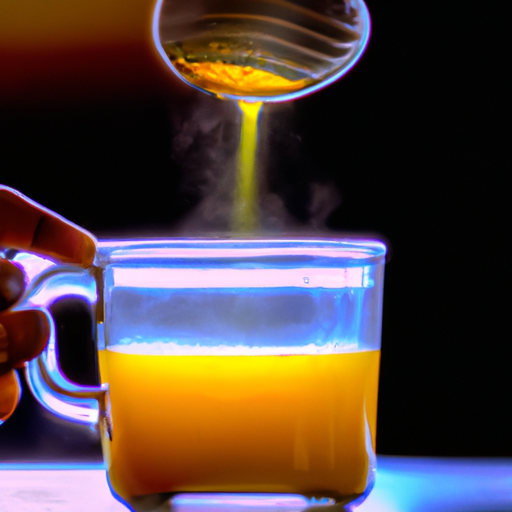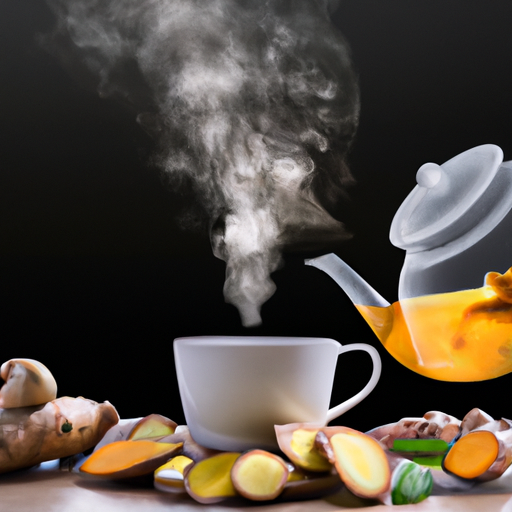I have often pondered as a frequent turmeric tea drinker, whether this delightful beverage could possibly stain my teeth yellow. Given its bright yellow hue and strong staining abilities, it is reasonable to worry about the impact of turmeric tea on dental health.
In this article, I will delve into the scientific composition of turmeric tea, examine the potential for teeth staining, and provide tips for preventing any unwanted discoloration.
Turmeric tea is a popular beverage made from the root of the turmeric plant, which is native to India and Southeast Asia. This plant contains a compound called curcumin, which is responsible for its bright yellow color and many health benefits. Curcumin has been linked to reducing inflammation, promoting digestion, and even preventing certain types of cancer. However, its staining properties have also been well-documented, leading to concerns about its effects on dental health.
In this article, I will explore the potential for turmeric tea to cause teeth staining and provide evidence-based strategies for maintaining a bright, healthy smile.
Key Takeaways
- Turmeric tea contains curcumin, which has anti-inflammatory and anti-cancer properties, but can potentially stain teeth.
- The frequency and concentration of turmeric tea can impact its staining potential, and using milk or honey may reduce the risk of staining.
- Prevention methods include using a straw, brushing teeth, and rinsing the mouth with water after drinking turmeric tea.
- Consultation with a dental professional and using high-quality sources is important to balance the potential risks and benefits of consuming turmeric supplements or tea.
Understanding the Composition of Turmeric Tea
Did you know that turmeric tea is made up of a unique blend of spices and herbs that work together to provide various health benefits? Turmeric, the main ingredient, has anti-inflammatory properties that can help reduce inflammation in the body. It’s also rich in antioxidants that can protect the body from damage caused by free radicals.
Other ingredients commonly found in turmeric tea include ginger, cinnamon, black pepper, and honey. These ingredients not only add flavor to the tea but also provide additional health benefits such as boosting the immune system and aiding in digestion.
Turmeric tea benefits are numerous, and there are many recipes available to suit different tastes. Some people prefer to mix turmeric with milk and honey for a creamy and sweet taste, while others add lemon and ginger for a zesty kick. Regardless of the recipe, one thing is certain – turmeric tea is a great way to incorporate this superfood into your daily routine.
But as with any food or drink, it’s important to be aware of any potential side effects. In the next section, we’ll examine the potential for teeth staining caused by turmeric tea.
Examining the Potential for Teeth Staining
You may be surprised to learn that your pearly whites could be at risk of staining if you consume certain beverages. Turmeric tea is no exception. This potent tea is known for its numerous health benefits, but it’s important to understand that it contains curcumin, a compound that has the potential to stain teeth.
Here are four factors to consider when examining the potential for teeth staining from turmeric tea:
-
Frequency of consumption: Drinking turmeric tea once in a while is unlikely to cause significant teeth staining. However, if you consume it on a daily basis, your teeth may start to show signs of discoloration.
-
Concentration of curcumin: The higher the concentration of curcumin in your turmeric tea, the greater the risk of teeth staining. If you prefer a stronger tea, consider sipping it through a straw to minimize contact with your teeth.
-
Preparation method: The way you prepare your turmeric tea can also impact its staining potential. Adding milk or honey to your tea can help reduce the risk of staining.
-
Prevention methods: There are several prevention methods you can use to keep your teeth white while still enjoying the benefits of turmeric tea. Brushing your teeth after drinking the tea or rinsing your mouth with water can help remove any potential staining agents.
When it comes to maintaining a healthy smile, it’s important to consider the potential impacts of the foods and beverages you consume. While turmeric tea may have some staining potential, there are alternative options available to help minimize the risk.
In the next section, we will explore the importance of considering the frequency and amount of consumption when it comes to minimizing the risk of teeth staining.
Considering the Frequency and Amount of Consumption
When consuming any food or beverage, it’s crucial to consider both the frequency and amount of intake. This is particularly important when it comes to turmeric tea, as many people are concerned about its potential to cause teeth staining. However, it’s worth noting that while turmeric does have the potential to cause staining, this is largely dependent on how often and how much of it you consume.
Studies have shown that the frequency of consumption is a key factor in determining the degree of staining caused by turmeric tea. The more often you drink it, the more likely it is that you will experience some degree of staining. Additionally, the amount of turmeric in each cup of tea can also have an impact on staining. Generally speaking, the more concentrated the tea, the more likely it is to cause staining. With this in mind, it’s important to be mindful of how much turmeric tea you are consuming and how often you are drinking it.
When it comes to preventing staining from turmeric tea, there are a number of strategies you can use. By being mindful of your consumption habits, using a straw to minimize contact with your teeth, and practicing good oral hygiene, you can help to minimize the risk of staining and keep your teeth looking their best.
Tips for Preventing Teeth Staining
As someone who’s conscious about the potential risks and benefits of consuming certain foods or beverages, I always make an informed decision before adding them to my diet.
This is especially true when it comes to preventing teeth staining, which can be a concern for those who enjoy drinks like turmeric tea.
By weighing the potential risks and benefits and considering the latest scientific evidence, I can make smarter choices that protect my dental health while still enjoying the foods and beverages I love.
Weighing the Potential Risks and Benefits
Balancing the potential risks and benefits, drinking a cup of turmeric tea may add a warm glow to your smile, but it could also lead to discoloration over time. Turmeric, a bright yellow spice commonly used in Asian cuisine, has been touted for its health benefits and cultural significance.
It has been used for centuries as an alternative remedy for various ailments and is now available in the form of turmeric supplements. While turmeric has been shown to have anti-inflammatory and antioxidant properties, there is limited research on its effects on dental health.
Some studies suggest that the active ingredient in turmeric, curcumin, may have antibacterial properties that could benefit oral health. However, the yellow pigment in turmeric can also stain teeth over time, particularly if consumed in large amounts or in a concentrated form. Therefore, it is important to weigh the potential risks and benefits before consuming turmeric tea or supplements for dental health.
Consult with a dental professional before making an informed decision about consumption.
Making an Informed Decision About Consumption
It’s crucial to consult with a dental professional before deciding whether or not to consume turmeric supplements or tea for potential oral health benefits. While turmeric has been traditionally used in Indian medicine for centuries and has shown promising results for its anti-inflammatory and antioxidant properties, there are still potential risks to consider.
Some of these risks include staining of teeth and tongue, allergic reactions, and digestive issues. To make an informed decision about consuming turmeric, it’s important to weigh the benefits against the risks. Here are 5 things to consider before adding turmeric to your daily routine:
- Research the specific benefits turmeric may provide for your individual health concerns
- Discuss any potential interactions with current medications or medical conditions with your healthcare provider
- Look for high-quality sources of turmeric to ensure potency and purity
- Consider using a straw or rinsing your mouth with water after consuming turmeric to minimize staining
- Pay attention to how your body reacts to turmeric and stop consuming it if you experience any adverse effects.
Overall, while turmeric may have potential health effects, it’s important to approach its consumption with caution and under the guidance of a healthcare professional.
Frequently Asked Questions
What are the health benefits of turmeric tea?
I’ve personally noticed reduced joint pain and inflammation since incorporating turmeric tea into my routine. Studies suggest it may also improve brain function and lower risk of heart disease. Its anti-inflammatory properties make it a powerful addition to any wellness regimen.
Can turmeric tea be consumed with milk or sugar?
Turmeric tea can be consumed with milk alternatives and sweeteners like honey or stevia. While there is little scientific evidence to support its use as a facial treatment, turmeric’s anti-inflammatory properties make it a popular ingredient in skincare products.
Is there a recommended time of day to drink turmeric tea?
The best time to drink turmeric tea is in the morning or after a meal. To brew, add 1 to 2 teaspoons of turmeric powder to boiling water and let steep for 10 minutes. Add honey and lemon if desired.
What is the recommended amount of turmeric tea to consume per day?
Ironic that we ask about a daily limit for turmeric tea, given its notorious staining power. However, research suggests 1-3 grams of curcumin in turmeric per day is safe. Always consult a healthcare provider.
Can turmeric tea be used as a teeth whitening remedy?
Turmeric tea has been shown to have mild teeth whitening properties due to its active ingredient, curcumin. However, it can also stain teeth if consumed in excess. It is not a substitute for professional teeth whitening treatments.
Conclusion
In conclusion, as someone who regularly drinks turmeric tea, I can confidently say that it hasn’t stained my teeth.
However, it’s important to understand the composition of turmeric tea and its potential for teeth staining. The active ingredient in turmeric, curcumin, has been found to have staining properties, but the amount present in a cup of tea isn’t significant enough to cause noticeable staining.
That being said, frequent and excessive consumption of turmeric tea could potentially lead to teeth staining. It’s important to practice good oral hygiene and limit the consumption of any food or beverage that may cause staining.
Additionally, incorporating preventative measures such as using a straw or rinsing with water after drinking turmeric tea can also help prevent staining.
Overall, with proper consumption and preventative measures, turmeric tea can be enjoyed without the fear of teeth staining.










